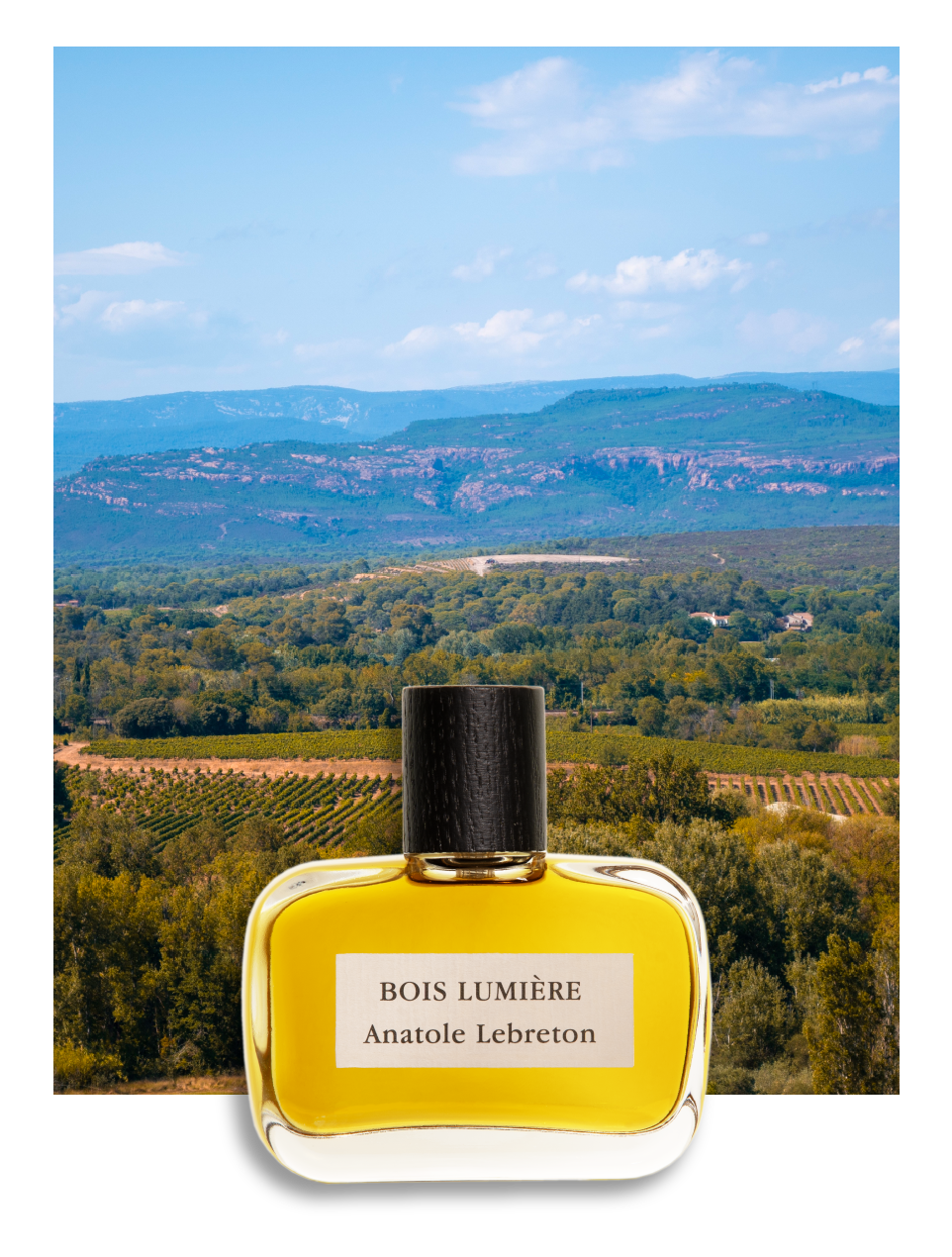A word from the Perfumer
“I design fragrances to inspire a shared emotion, a signature to unleash, a flame to ignite that would extend the limits of our realities. In a word, to ignite one’s super-self! Perfumes to adorn & own yourself.”

The Manifesto
Anatole envisions perfume as the very tool for self emancipation and connection to others.
He crafts fragrances for those who, far from superficial promises of transformation, aim to be even more themselves, for those who are not afraid to be who they are.
Anatole Lebreton’s fragrances are conceived as explosions of singularity and sincerity, full of transgressive audacity and not devoid of tenderness.
Inspired by the raw poetry of nature and phantasmagorical art, Anatole’s creations strive to re enchant reality and offer a perfumery that is assertive yet mischievous, imaginative and insolent.
The Creator
For Anatole Lebreton, it’s vital to generate emotions, to induce an olfactory experience.
With a very diverse background in ethnology, volunteer work, popular theater, gemology, as well as working in the worlds of fine tea & chocolate, Anatole eventually fell in love with perfume.
Initially an amateur and passionate collector, this insatiably curious spirit became a perfume composer in 2013, the best way for him to quench his thirst for creativity.
Operating on instinct rather than intellect, he has since created 11 fragrances for his brand, and occasionally composes for commissions he receives
« For me, each perfume is like a poem, a scented feeling, a fragrant landscape. I want you to feel at home, to be able to tell your own stories. I want my creations to inspire dreams and trigger emotions. The best compliment you can ever return is to tell me how my creations move and transport you. »

SINCERITY
to say what you think & do what you say Simple as that.

AUDACITY
to live without compromise, to create wild, insolent explosions of singularity.

GENEROSITY
to redefine reality and re-enchant the world, with compassion and kindness.
Find your perfect fragrance
FAQ
Are your fragrances natural?
For 140 years, modern perfumery has been mixing natural materials (essential oils, absolutes, resins, etc.) with synthetically-produced materials (either molecules that already exist in nature but would be too expensive to extract from natural materials, such as vanillin, or molecules created directly in the laboratory). I use all kinds of materials, depending on the fragrance’s requirements, with a particular concern for aesthetics and environmental care.
Current standards for natural fragrances are a bit biased:
There’s the ISO 9235 standard – 100% natural – that doesn’t mean it’s environmentally friendly. In fact, the carbon footprint of many natural products is gigantic (it takes 2.3 tons of rose blossom to make 1 kg of essence + some species, such as white sandalwood, are threatened by overexploitation…) plus, unfortunately, these materials are often also those that are allergenic.
The other standard: ISO 16128 = Of natural origin, which you see everywhere, is even less significant, as it takes into account the alcohol that composes over 85% of fragrance. So we could have a 100% synthetic concentrate in a natural alcohol, and the final count would be (at 15% fragrance concentration) “85% natural origin”.
In short, I use a lot of beautiful natural raw materials, sometimes very expensive ones like tuberose absolute, and in this case I source eco-responsible and fair-trade materials – as well as synthetics. In the latter case, I try as far as possible to source materials issued from green chemistry, or with a low carbon footprint and a high renewability rate.
What is Green Chemistry?
Some synthetic raw materials are known to be major pollutants, harmful to the planet and sometimes to humans. But new techniques have also been developed, based on innovative, natural processes such as fermentation or the recycling of waste from the wood industry. As far as possible, I favor those eco-responsible synthetics as well as fair-trade natural materials (properly paid workers, sustainable production, not overexploitation).
Are your fragrances vegan?
Only Bois Lumière features beeswax, a substance of animal origin. Civet and
castoreum listed in the notes of L’Eau de Merzhin & L’Eau Scandaleuse are
vegan recreations.
Are your fragrances cruelty-free, i.e. not tested on animals?
That’s the European legislation since 2014!!! (https://www.economie.gouv.fr/groupe1/cosmetiques-ne-vous-fiez-pas-lallegation-non-teste-sur-les-animaux# ). My fragrances have only been tested on one animal – myself and a few friends who agree to be guinea pigs for testing my creations, to ensure that the result is suitable for all human skin types and worthy of you.
Where and how are your fragrances made?
My perfumes are homemade, literally, at home. I make small-scale productions by hand. This gives me complete control over my products and what I sell to you. So I’m the one who formulates the perfume, manages the manufacturing, maturing and maceration of the fragrances, puts them in bottles and boxes, sticks the labels and prepares the parcels for dispatch.
What's the concentration of the fragrances?
They are all Eau de parfum. That said, a high concentration (the percentage of perfume concentrate diluted in alcohol) doesn’t necessarily make a good perfume, and it doesn’t mean much. If the fragrance formula contains, for instance, 30% Iso E super, 20% hedione and other “filler” raw materials, then the concentrate probably can be diluted to 20%. If, on the other hand, the formula contains a lot of natural ingredients, few fillers and high-impact raw materials, then a lower concentration is more appropriate. And this has little relation to the longevity and projection of the fragrance. Bois Lumière, for example, which contains around 8% of immortelle flower (everlasting) – an aptly named ingredient – is diluted to only 7%, yet it’s one of my most powerful and long-lasting fragrances. My rule of thumb is that the more naturals there are, the more dilution it needs, to open it up and let the fragrance breathe.
Do you accept returns and exchanges?
You have a cancellation period of seven working days, starting from the day of delivery
to return, at your expense, the product(s) ordered.
The return and/or exchange of products containing alcohol is subject to a specific procedure: the Product(s) must be returned complete, unopened, in perfect condition and in their original packaging, accompanied by the delivery note, the invoice and the customer returns form available in the General Terms and Conditions.
If the value of the selected alternative Product(s) is (are) higher than the value of the returned Product(s), you will be liable for the price difference, in accordance with the GCS.
If the replacement Product(s) selected is (are) of lesser value than the Product(s) returned, I will refund the difference in price in accordance with the GCS, within thirty (30) working days of receipt of the returned Product(s).
Is it normal for my perfume to change color or scent?
It’s quite normal for your perfume to change color as it ages. Some materials, such as vanillin or indole, are prone to discoloration over time. This does not necessarily mean that the smell has been altered. Likewise, depending on the
batches, the color of my creations may vary slightly. The jasmine harvested in 2023 is not quite identical to that of 2024, resulting in slight variations in color and scent.
If the fragrance’s odor changes, this may be due to natural aging, but also to poor storage conditions: be sure to keep your bottle away from light and temperature variations.
How come I can't smell my perfume anymore?
The nose becomes accustomed to it. Often, you no longer smell of your beloved perfume, but your neighbors still enjoy the scent. When I wear a perfume, I like to forget about it and let it come back to surprise me as the day goes by. If you also wear other fragrances from laundry detergents (which have very strong, all-purpose scents), cosmetics… the whole thing will tend to saturate and tire out your nose, often preventing you from enjoying your perfume of the day.
It’s ocnter-intuitive, but you have to resist the temptation to over-spray and increase the quantity, which creates even more saturation. The more you spritz, the less you smell!
